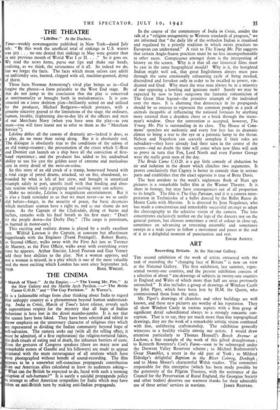THE THEATRE
" Lifeline." At the Duchess.
Time—weekly newsmagazine published in New York—dated July 6th: " By this week the unofficial total of sinkings in U.S. waters was 323 . . . no one denied that sinkings in May were greater than in any previous month of World War I or II. . . ." So it goes on. We read the news items, purse our lips and shake our heads, realising, as we think, the seriousness of it all. So indeed we do, but we forget the facts. The facts which mean sailors cast adrift on unfriendly seas, burned, clogged with oil, machine-gunned, dying of thirst.
These facts Norman Armstrong's vivid play brings us in—God forgive the phrase—a form palatable to the West End stage. By this do not jump to the conclusion that the play is conceived in sentimentality or brought forth in melodramatics. It is con- structed on a loose skeleton plan—brilliantly seized on and utilised by the producer, Michael Redgrave—which portrays, with a genuine sincerity geared td the limitations of the stage, the ordinary, human, lovable, frightening day-to-day life of the officers and men of our Merchant Navy (when you have seen the play—as you must—you will have learnt not to refer to them as the " Merchant Service ").
Lifeline defies all the canons of dramatic art—indeed it does, as a play, do no more than string along. But it is absolutely real. The dialogue is absolutely true to the conditions of the saloon of an old tramp-steamer ; the presentation of the crises which U-Boat and Domier can launch on a ship have all the conviction of first- hand experience ; and the producer has added to his undoubted ability to use his cast the golden asset of extreme and meticulous care in every detail of the mise-en-scene.
So this story of an old crock of a tramp, homeward bound with a vital cargo of petrol drums, attacked, set on fire, abandoned, re- boarded by what is left of her crew, and brought in unnoticed triumph safely to port, unrolls itself with that binding and abso- lute realism which only a gripping and exciting story can achieve.
Make no mistake, Lifeline is magnificent entertainment. But it is also a frank reminder to us that we must never—as we so easily did before—forget, in the security of peace, the basic decencies which merchant seamen have a right to, and to our shame do not attain. As the Captain of the Clydesdale, dying of burns and bullets, remarks with his final breath to his first mate: " Don't let the people down—for Derby Day." (The cargo is petroleum, as burned in motor-cars.)
This exciting and realistic drama is played by a really excellent
cast. Wilfrid Lawson is the Captain, at constant but affectionate loggerheads with the Engineer (Frank Pettingell). Robert Beatty, as Second Officer, walks away with the First Act just as Terence de Marney, as the First Officer, walks away with everything every time he appears. Arthur Sinclair, Lloyd Pearson and Guy Verney add their best abilities to the play. Not a woman appears, and not a woman is missed, in a play which is one of the most valuable and the most exciting which London has seen since September 3rd,


























 Previous page
Previous page